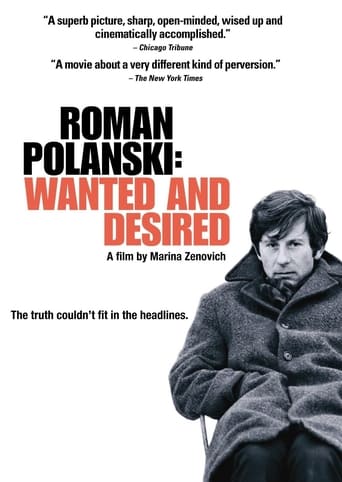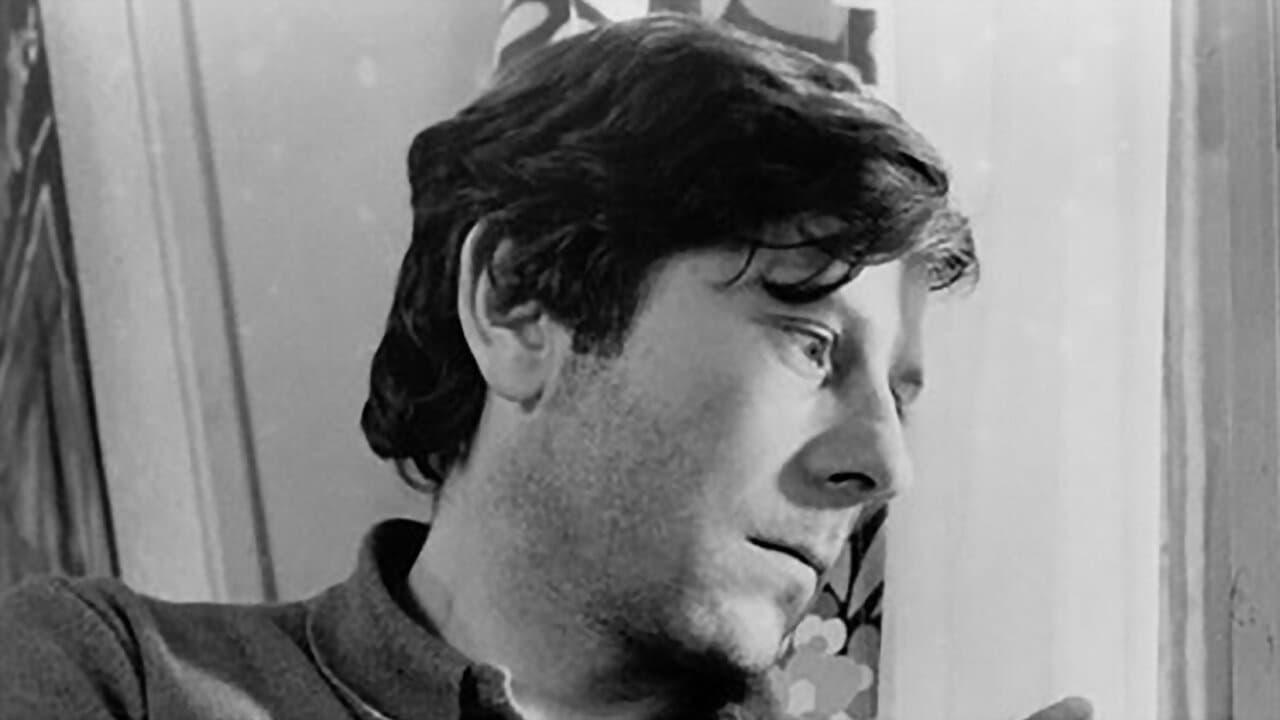gavin6942
Examines the public scandal and private tragedy which led to legendary filmmaker Roman Polanski's sudden flight from the United States.I was rather impressed with this documentary. I thought it would offer a broad overview of Polanski's life, and it did not. It had just enough to give you a feel for the man and then focused on the different aspects of the criminal trial against him.Polanski fled this country before I was born, so I certainly did not hear about his crimes from the newspaper or television at the time they happened. I was under the impression he was charged and then immediately ran away. The film shows that is not entirely accurate, that he actually spent a little time in prison and even after leaving once, he came back. This cleared up a lot of misconceptions I had.Having read a biography on him and having seen all his movies (yes, even the weaker ones -- though not his short films), I was pleased that something new could still be learned.
Eternality
Poland has produced great filmmakers such as Andrzej Wajda (Ashes and Diamonds, 1958; Man of Marble, 1977) and Krzysztof Kieslowski (A Short Film About Love, 1988; Three Colors: Red, 1994) whose works address directly issues of war, politics, economic turmoil, and moral unrest that have affected their country since WWII. Their films take a serious, hard-nosed slant, and are mostly well-known only in film scholarship and festival circuits.The other great Polish film director is Roman Polanski, who completes what I dubbed as the "holy trinity of Polish cinema". He is known as the Polish Hitchcock, with films from his early career dwelling in the genre of horror, thriller, and mystery. He further established himself in America with unforgettable films such as Rosemary's Baby (1968) and Chinatown (1974). He also became the first Polish filmmaker to win the Oscar for Best Director for The Pianist (2002).The most controversial filmmaker to emerge from Eastern Europe of the last fifty years, not for his films (though some are) but for his widely-documented life story, Polanski is able to divide public opinion of him with just the mere mention of his name. This becomes the pursued theme of Marina Zenovich's documentary feature Roman Polanski: Wanted and Desired, an above average film that is more informative than entertaining.I will summarize his life story in one paragraph: A young Polanski escaped the horrors of WWII but the Nazis executed his parents during their brutal reign. He grew up to enjoy fine life, womanizing, and film-making. He was at the height of his career when his pregnant wife was murdered. His life crumbled even further when he was accused of unlawful sexual intercourse with a minor (who much later publicly forgave him). He pleaded guilty but the trial was not ethically handled by Judge Rittenband. Polanski then fled the US and never came back.Through my observation, Polanski is not really made the subject of Wanted and Desired. Rather, it is the handling of the trial that seems to be Zenovich's primary focus. In the film, Polanski takes on the character that we are pressured to empathize with. Zenovich portrays him as a tortured person under too much media glare at that time, and his "escape" to France as a fugitive is seen as a liberating one.Zenovich uses archival footage, and weaves them with interviews with key persons involved in the trial. Much of her film reveals the flawed, publicity-loving personality of Judge Rittenband, the unfair treatment of Polanski by the press, and the circumstances involving Polanski's alleged sexual assault. In an unbalanced way, Wanted and Desired plays too much on the "Wanted" card, whereas the "Desired" part only comes out as such in the final fifteen minutes of the film.My stand on the Polanski sexual scandal is that no matter the reputation of the accused, he or she should be sentenced accordingly. However, the suspect handling of the trial has raised concerns over the quality and ethicality of the US judiciary system. Polanski was right to flee the US under the circumstances. Now that he is arrested again in Switzerland for that case that goes back to more than three decades, the question to ask is: Is it really still worth pursuing? SCORE: 6.5/10 (www.filmnomenon.blogspot.com) All rights reserved!
DICK STEEL
For those who want a quick snapshot of the entire hullabaloo surrounding acclaimed director Roman Polanski and the slew of charges against him, one for having sex with a minor of 13 years, then this documentary by Marina Zenovich will present everything on a silver platter in digestible portions, though with any documentary, objectivity sometimes gets a little bit skewed. If you ask me for an opinion, I'm still a firm believer of serving time if done the crime, and under an imperfect system, there are always instances where we see the rich and the famous escape jail terms, like in Law Abiding Citizen which preached that truth is only what you can prove in a court of law.In presenting facts and the case itself, Roman Polanski: Wanted and Desired did a brilliant job in establishing the premise and providing that broad background of the director and his life, which seemed to have been rooted in tragedy from his childhood days during the Holocaust, and including the senseless murder of his pregnant wife Sharon Tate under the hands of the Charles Manson family. Clips from his iconic films were also included, and parallels somehow uncannily drawn from his darker films to mirror the darker days of his life, which worked in emphasizing his twisted state of mind if you're standing on that side of the fence.Zenovich also spent considerable time painting the picture of the media frenzy which surrounded Polanski during his younger heydays, and especially during the trial, where a distinction was made between the European and American press, one still fascinated by yet another twist and turn in his life, while the latter firmly demonizing a stranger in their midst, whose demeanour and physical built made it almost perfect as that classical villain out to exploit the meek. It's a media circus built around the director's reputation, which served as a double edged sword according to some as it is this repute that allowed the sensationalism to hit the roof in terms of selling papers.What's more intriguing in this documentary, is how Zenovich assembled and presented the crux of the film, that on the appointment and backgrounds of the legal eagles handling the case, with talking head interview segments with the lawyers involved. It's a pity that the judge Laurence J Rittenband was not included in modern day interviews because of his passing, but from the archived clips, court documents and testimonies gathered, his is the key which probably made Polanski flee. After all, how can one trust a court presided by a judge with ulterior personal motives ranging from wanting to get the limelight from such a high profile case, to having personal emotions play such a huge part in deciding on punishment, and the benefits of lack thereof to personal reputation.It's down to Zenovich's skill in assembling the timeline of events, recounting court incidents and evidence that makes this documentary a compelling watch, especially when she launches into a tirade that questions the integrity of the judge through his gerrymandering of the entire legal process and the perversion of justice, and how a judge, competent or otherwise, holds plenty of cloud over the proceedings and punishment, despite flip-flopping on bargains and promises made.It's been decades since that faithful day of the deed, and both the director and the child back then had already moved on in their lives. It's quite clear that both want to put this episode behind them with even the victim forgiving Polanski, and public opinion as well as that of peers are divided between forgiveness and punishment nonetheless, it's interesting to see how things will develop hereon, after all it has been left hanging in the balance already for so long. Like I mentioned, this documentary somehow portrayed Polanski as a victim of an inconsistent court process yes, but you cannot deny that a crime is a crime, and one has to face the music, famous personality or not.
MisterWhiplash
Roman Polanski is guilty, and the filmmaker behind this documentary, Wanted and Desired, does not at any point refute that. If anything, the director makes sure to show that the people who were involved with the case- the detectives, the lawyers, even his friends- don't refute what Polanski did in 1977 (the, at least, "sex with a minor" of a 13 year old, if not really just rape), and know that justice should have been served. But what's remarkable is the argument that is made: Polanski fled in 1978 to France and stayed until just recently his arrest in Switzerland, and it's not entirely unforgivable.How can this argument be made? Quite simply by looking at the facts of not the case inasmuch as the perception of it, the media circus environment influencing Judge Rittenband, who first gave Polanski a 90-day psychiatric evaluation in lieu of a sentencing (or at least probation, which was what might have been the charge), then reneged on the deal of Polanski not serving any time. The judge decided this not because of a sudden change of heart, or realizing a possible mistake on his part to reject the original plea deal, or even to accept it. It was so that the media would be happy, that the circus would be appeased with some kind of indeterminable punishment. When a Mormon prosecutor, who has every reason to throw the book at Polanski, sides with the defense in looking at a judge's untrustworthy reasoning, there's trouble in Dodge.The documentary tackles a case that should have been at least somewhat easy to maneuver and looks into the problem areas of perception: how the judge perceives Polanski, how the lawyers perceive the case, how the girl at the time, now a 45 year old woman with three kids, perceives the whole ordeal in bewilderment. By focusing on the details and the things that made this Judge Rittenband tick, and then also on Polanski's background as a filmmaker and his history of highs and lows (highs being his early career in the 60s, low points being his parents holocaust deaths and his wife's murder by Manson), we get a full picture of a Hollywood law system f***ing with a man prepared for a fair verdict, and then the result of fallout.It's compelling to make such an argument about his fugitive status, but the case is made and it sticks with you. Some will completely disagree, and some will be taken very much by the evidence of malfeasance at the time and the necessity of a re-trial (or, as some have suggested, a dismissal of the case entirely). Wanted and Desired presents the information and merely asks us to take them as we will. It's this that makes it brave, and worth seeing and talking about.



 AD
AD

